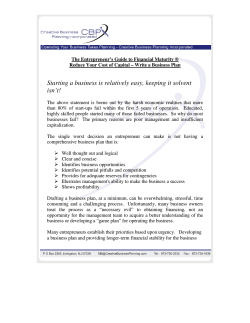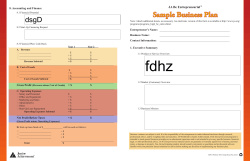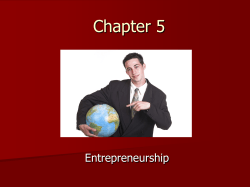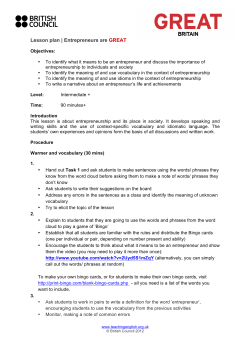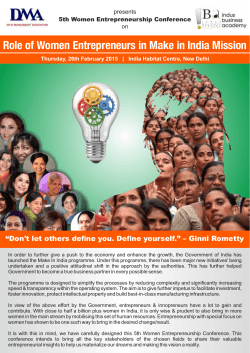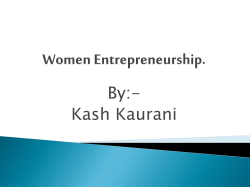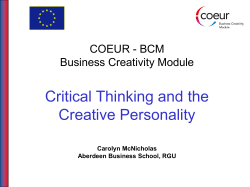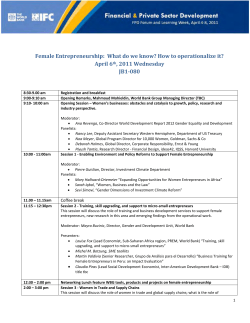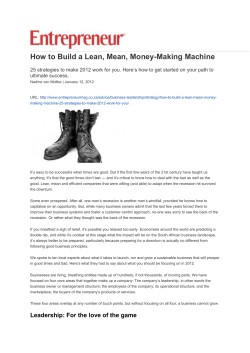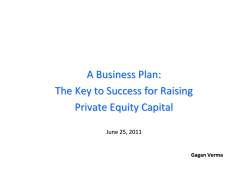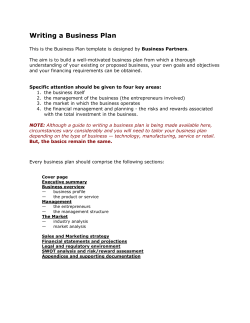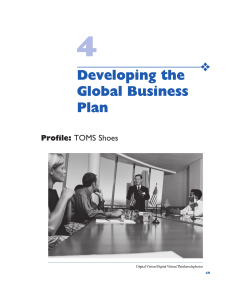
Introduction to Entrepreneurship Week 1 – October 5, 2004 1
FM20731 – Executive Leadership Introduction to Entrepreneurship Week 1 – October 5, 2004 1 Let’s see your schedules! 2 Why are you here? What do you want to do? 3 Instructor • Instructor: Max Minkoff • Teaching style: Interactive! • How to contact me: max@dancingbearmail.com • Website: http://www.planetminkoff.com • Other availability: Immediately after class 4 Why am I here? • Education – MS IE/ Human Factors: Virtual Reality – MBA in 2001 • Entrepreneur – Started first business in college – Joined VR Consumer Products startup • Went “public” in 1995 • Ceased operations in 1997 – Joined 3D ID Software startup • Company was sold – Cookie startup (with Kirk), 2002-2004 5 Course Content • Teaching Strategies – Interactive Class Discussion – PowerPoint w/printed notes – Team exercises • Textbook: – Entrepreneurship • Lambing, Peggy and Kuehl, Charles 6 What is an Entrepreneur? ENTREPRENEURSHIP Insane perseverance in the face of total rejection. 7 What Is An Entrepreneur? ENTREPRENEUR A vision-driven individual who assumes significant personal and financial risk to start or expand a business. 8 What Is An Entrepreneur? ENTREPRENEURSHIP The pursuit of opportunity through innovation, creativity and hard work without regard for the resources currently controlled. 9 Entrepreneurship • Entrepreneurship: a way of thinking, reasoning, and acting that is: – opportunity obsessed – holistic in approach – and leadership balanced (This definition of entrepreneurship has evolved over the past two decades from research at Babson College and the Harvard Business School and has recently been enhanced by Stephen Spinelli, Jr., and John H. Muller, Jr., Term Chair at Babson College.) 10 Entrepreneurs: Born or Made? • Is there inborn talent required? • Assume that the answer is YES: – then we can identify the main characteristics – if we have them, fine - no others need to apply! – we could start spotting talent in kindergarten – we could "stream" these people – we could discourage people without these talents 11 Entrepreneurs: Born or Made? • Assume the answer is NO: – then schools could teach anyone – would be a "profession" like law or medicine – companies could establish "nurseries" for them – government "incubators" would be successes • The real answer lies somewhere in-between – Talent and education is the way 12 Who is an Entrepreneur? Situational more than personality Flexibility Ability Age Distribution for Starting Company 20 25 30 35 40 45 Age 13 Who is an Entrepreneur? Manager’s Opportunities Future Goals Possible Change Status Quo Entrepreneur Satisfied manager Frustrated manager Classic bureaucrat Perceived Capability Blocked 14 Burch's Entrep. Personality Traits 1.A desire to achieve Conquer problems, create successful venture 2.Hard work Their workload is very hard to match 3.Nurturing quality 4.Acceptance of responsibility Morally, legally and mentally accountable 5.Reward orientation Want be rewarded for their efforts 15 Burch's Entrep. Personality Traits 6.Optimism Anything is possible 7.Orientation to excellence Pride in something first class 8.Organization They are wholly "take charge" people 9.Profit orientation Profit primarily a gauge of performance 16 Failure? So what! • Failure seen differently in America & Europe. – In Europe it is a major set-back – U.S. expected (required even!) – Canada - in between but tending to U.S. • “Our” System: – Many entrepreneurs had been "blue collar" – Many come from families of entrepreneurs – Many are immigrants or their children – But, there are no "rules" that ensure success • Universally, entrepreneurs shake off failure! 17 Failure as “Learning Process” • Ignore it, then start again – Some find it easy to blame someone else • In public, always optimistic – Especially with funders – Agonise over what went wrong in private • Willingness to disregard the rules – Start from first principles. • Ability to "bend, not break" rules of life 18 Classic Entrepreneurship: The Startup • Raw startup company—an innovative idea that develops into a high growth company • Qualities of a startup company – Strong leadership from the main entrepreneur – Complementary talents and outstanding teamwork of team members – Skill and ingenuity to find and control resources – Financial backing to chase opportunity 19 Desirable and Acquirable Attitudes and Behaviors • • • • Commitment and determination Leadership Opportunity obsession Tolerance of – Risk – Ambiguity – Uncertainty • Creativity, self-reliance, and adaptability • Motivation to excel 20 The Entrepreneurial Process • It is opportunity/market driven • It is driven by a lead entrepreneur and an entrepreneurial team • It is resource parsimonious and creative • It depends on the fit and balance among these • It is integrated and holistic 21 The Timmons Model of the Entrepreneurial Process Communication Opportunity (2) Ambiguity Creativity Business Plan Fits and gaps Team (3) Uncertainty Resources (4) Exogenous forces Leadership Capital markets Founder (1) 22 Enlightened Serendipity • • • • • • Being in the right place At the right time, Recognizing it, and Acting upon it, APPROPRIATELY and PASSIONATELY!!! 23 Course Evaluation & Technology • Grading – 40%: Class Participation (including attendance) – 10%: Weekly Quizzes on Reading – 20%: Midterm Exam – 30%: Project • Technology Needed: – Word Processing – Spreadsheet – Graphics and PowerPoint 24 Attendance Policy • • • • Two absences = one full grade drop A third absence = an additional grade drop Four absences = Failure NOTE: – There are NO excused absences. – 2 lates and/or early departures = 1 absence. I WILL FAIL YOU IF I HAVE TO! 25 Cellphone Policy • OK if it rings – I don’t expect you to remember to turn it off • BUT! – Don’t answer your phone in class! – Don’t step into the hall to talk • Also – No text messaging 26 Next Class • Homework – Read Chapter 11: Buying an Existing Business – Read Chapter 12: Franchises & Other Alternatives • October 12 – Recognizing Opportunities – Buy an Existing Businesses – Open a Franchise – Other Alternatives – Quiz on Chapters 11 & 12! 27
© Copyright 2025




